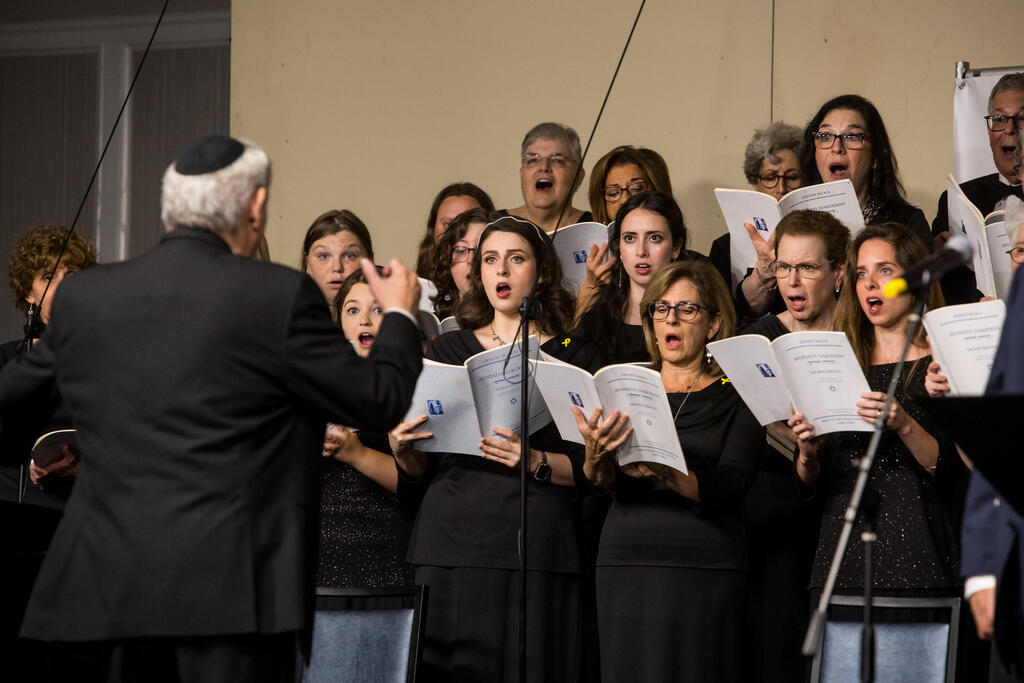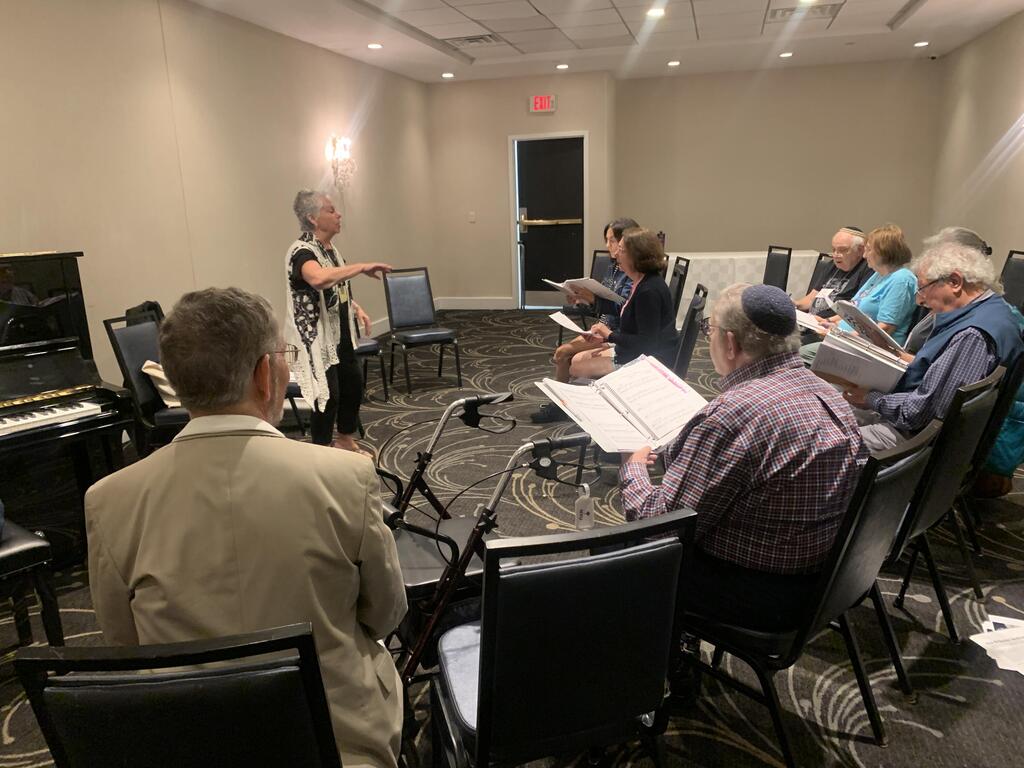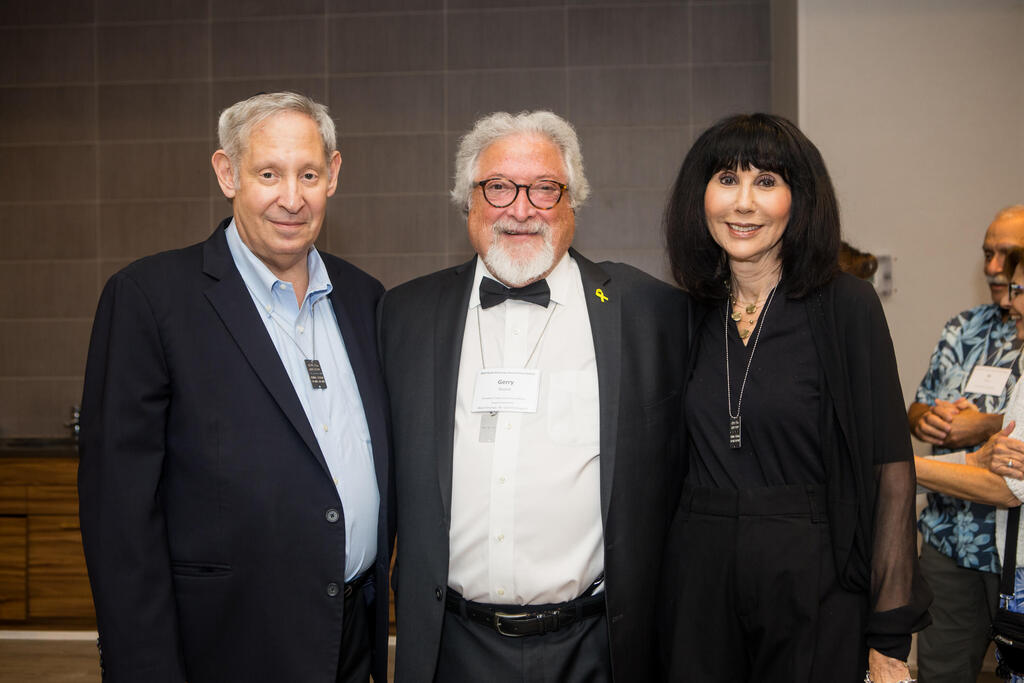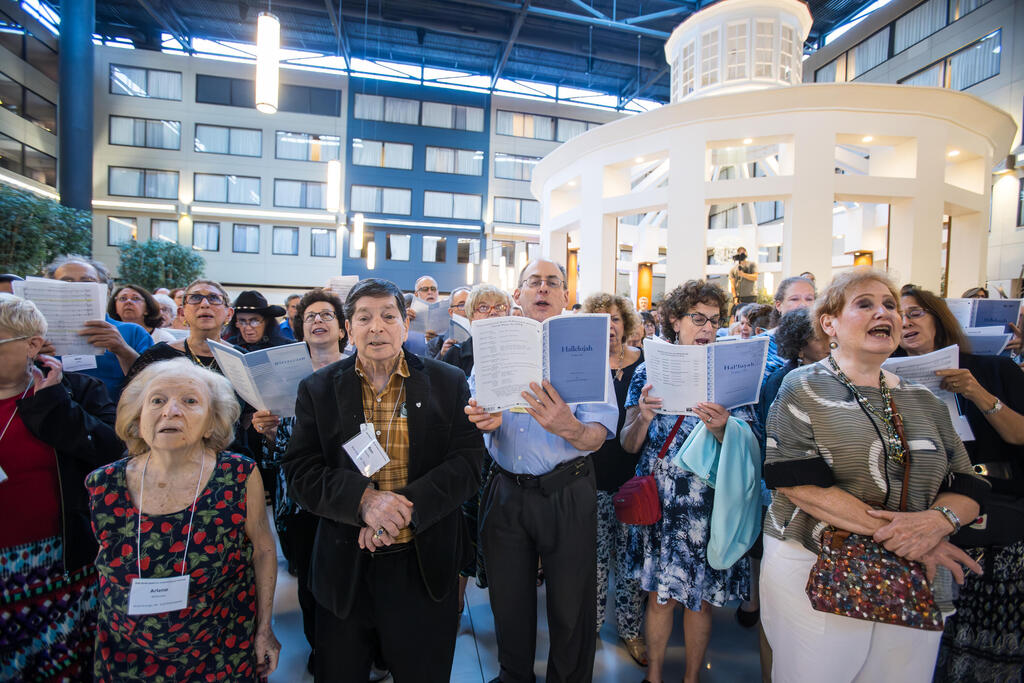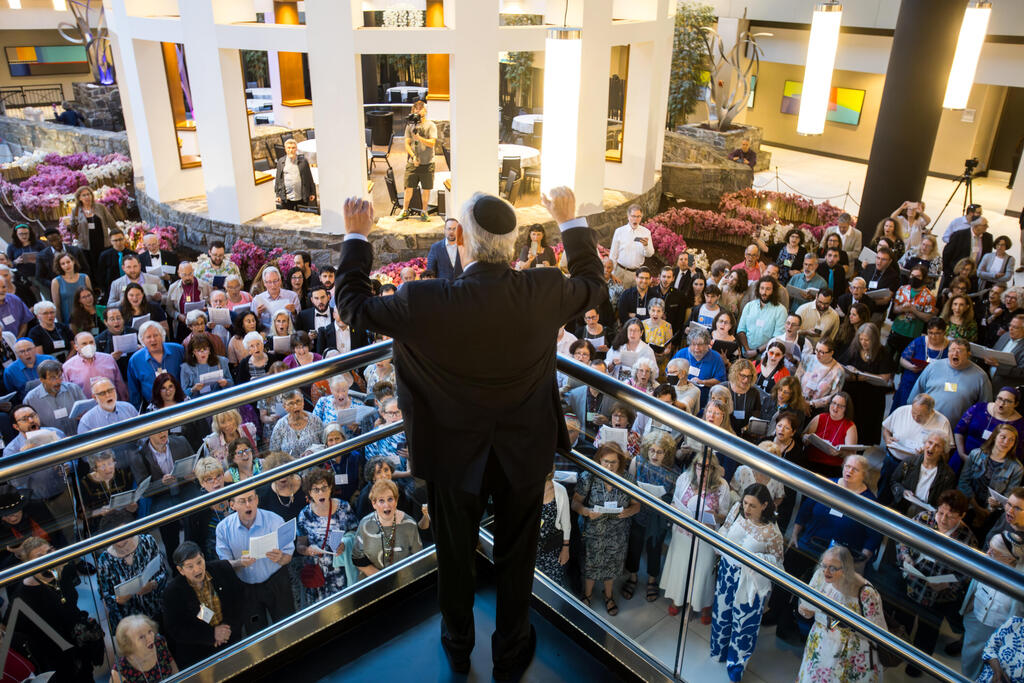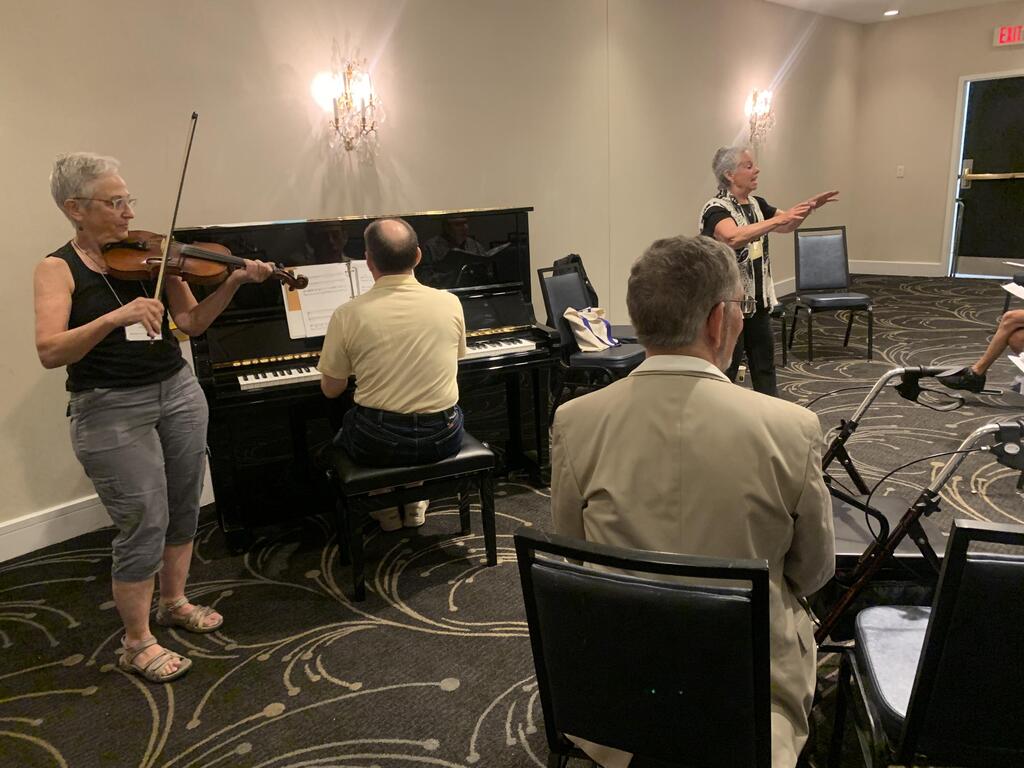Getting your Trinity Audio player ready...
When I first arrived in Stamford, Connecticut, I felt like I had wandered into some kind of quirky, musical twilight zone. Stamford, or if you’d like - the sister city to Afula - is not exactly a cultural hub, but this year it hosted an event that was both surreal and deeply moving. The sprawling hotel, selected for its kosher kitchen, mikveh and ample space, was alive with song and spirit as the North American Jewish Choral Festival took over.
Am Yisrael Chai, performed by Zamir Chorale & Zamir Noded, conducted by Matthew Lazar at the 2024 North American Jewish Choral Festival
(Dani Tennenbaum)
I stumbled into this world in the middle of the night, scrunched up from the trip, but Rahel Musleah, one of the regulars, calmed me down and started serenading me with Kvar Acharei Chatzot (It's After Midnight by Ilan & Ilanit), making it clear that I had entered a realm where every moment is an opportunity for a musical number.
Everywhere I turned, there were people singing – in hallways, the dining room and spontaneously bursting into harmony. It was as if I had landed in a boot camp for the Gevatron (Israeli Kibbutz folk singers group), or as others here jokingly referred to it: 'Brigadoon’ for Jewish choral singers,' which of course sent me straight to Wikipedia to figure out what they were talking about.
For five packed days, participants attended workshops on music and Judaism, rallied together for impromptu community singing and formed instant choirs organized by sight-reading skills. The hallways of the hotel buzzed with conversations and choral music wafting from every direction. You can’t take the elevator without hearing someone break into song. It’s like living in a musical – a kosher one.
Jim, my best pal for the next upcoming days, said he’s been coming here for years. “My kids laugh at me, saying, 'Dad’s going to summer camp.' But this year is special for him. It’s his first time back after having cancerous nodes removed from his throat. He couldn’t sing for five months, underwent special treatment to restore his voice, but now he is back at the festival, singing in the highest-level choir. “I wouldn’t miss this for anything in the world,” he says.
Among the sea of participants were familiar faces from Israel, vendors selling Judaica and some illustrious figures. The late Dr. Ruth Westheimer, for example, had a special fondness for the festival and the Zamir Choral Foundation, which defines itself as the only musical Zionist organization in the world.
8 View gallery
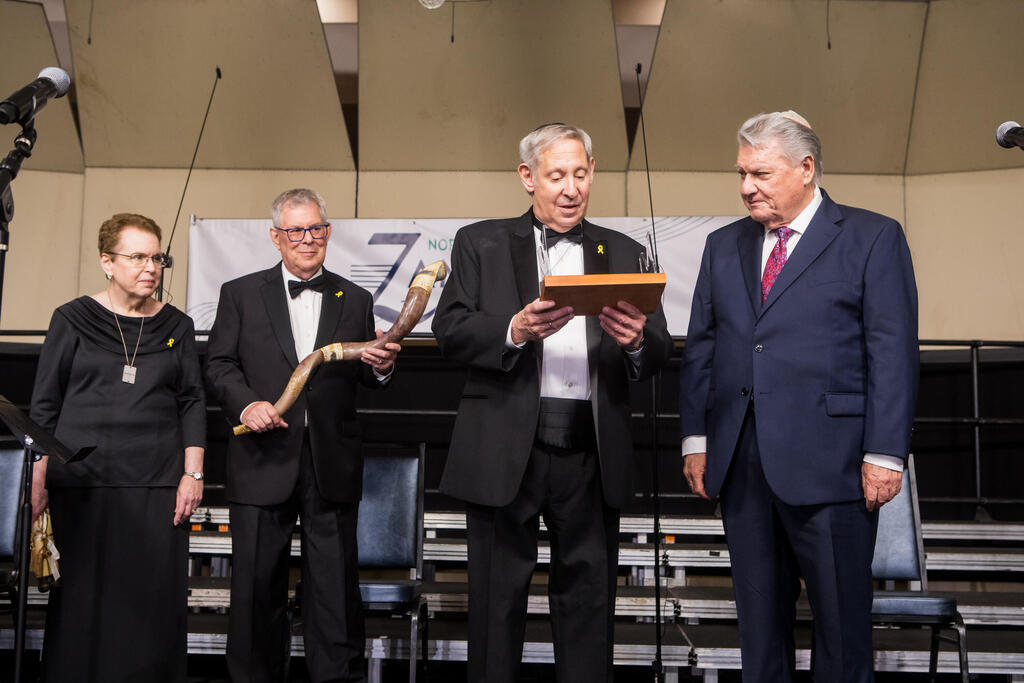

Marsha Bryan Edelman, Daniel Freelander, Matthew Lazar and Jacob Mendelson
(Photo: Jennifer Weisbor)
"She was a terrible singer," the foundation founder and director, Matthew Lazar, reminisces with a chuckle. "But she would come, mingle with the festival-goers, sell her book and donate all the proceeds to Zamir." Elie Wiesel, another honorary member, once conducted the choir during its Carnegie Hall performance in New York.
The foundation choirs have performed alongside and in honor of Israeli legends like Shoshana Damari, Yehoram Gaon and Naomi Shemer. Dor Kaminka, an LA-based choral conductor in one of the foundation’s teen choirs, captured the shift in the festival's atmosphere this year.
“We were just talking about the festival and a gala concert at Carnegie Hall three months ago,” Kaminka reflected. “This year was remarkably different. Everyone understood they were there for a reason, both Israelis and Americans. In my head, all the Americans were there to support the Israelis. But the Israelis also said: 'We hope you know we are also here for you.' American Jews have been going through challenging times that aren’t necessarily easier than being a Jew in Israel right now. We're all feeling the weight of what's happening."
"Just like in Israel, the Jewish community here is struggling. This festival is a place where we can come together and support one another, find some comfort in the music and in each other. The mission of the choirs has always been important, and this year it also kind of became desperately urgent,” he said.
8 View gallery
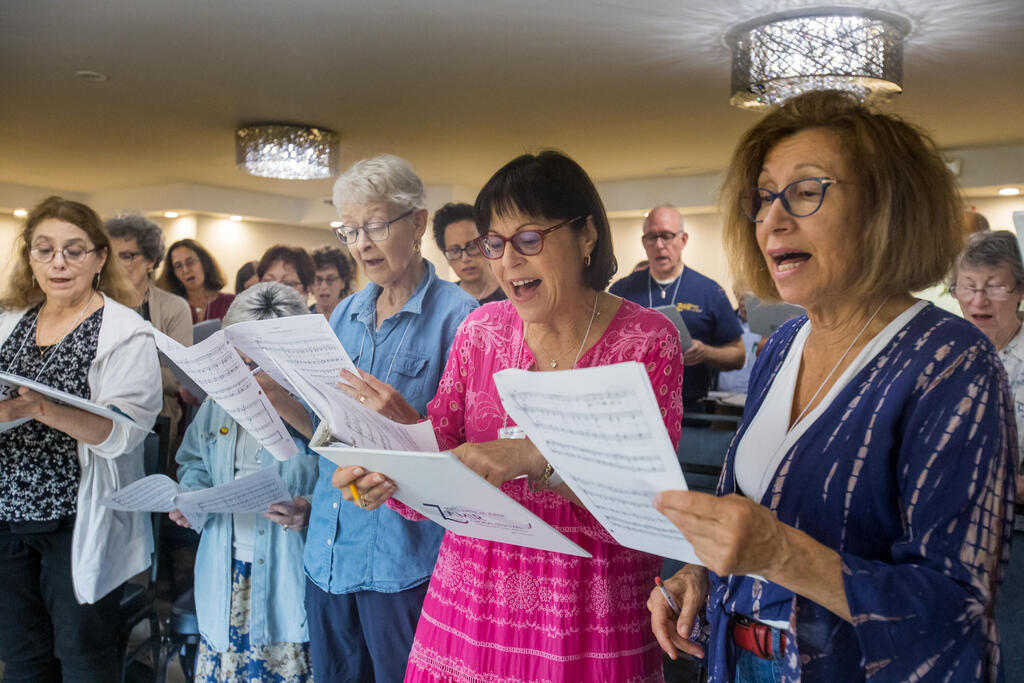

Singing in harmony at the North American Jewish Choral Festival
(Photo: Jennifer Weisbor)
Shani Chamovitz, a dedicated participant and young talent from Israel, says this year the festival feels different. There is an unspoken understanding among everyone that they were there for a reason, to support each other through these challenging times," she explained.
“It’s overwhelming in the best possible way. Every single word and chord has more meaning than in the past. I feel a hug from our American friends and allies who are very much aware of everything that's happening," she added.
On one particularly poignant evening, the festival held a special night dedicated to songs for Israel, featuring performances of “Bring Them Home” while wearing pins and dog tags bearing the names of the kidnapped and their number of days in captivity. The weight of Oct 7 hung heavily, yet the music provided a sense of resilience and hope. The focus seemed to shift toward supporting a cause, rather than just performing for enjoyment.
As I watched the final performance, the choirs sang with a depth of emotion that transcended the notes on the page. Israeli songs really did take on new meanings, resonating deeply in this moment of shared grief and hope. I found myself tearing up during Rikma Enoshit Echat (One Human Tapestry, Ninet’s version of course). But humor was not in short supply, either. The choirs for the final performance were given quirky names like "Jerry’s Tarrytown Refugees," named after the city where the festival was originally supposed to take place before the hotel canceled at the last moment due to a mysterious power outage.
Matthew Lazar, affectionately known as "Matti," founded the Zamir Choral Foundation in 1990, aiming to expand Jewish choral activity. Raised in a modern Orthodox family in Brooklyn, he grew up playing piano from age four and learning the music of Jewish composers.
The festival he created is unique not just because of the number of Jewish singers it brings together –around 250 this year – but because it unites people of all ages, abilities, religious beliefs and political affiliations. "It’s a place where everyone is forgetting about things that tear us apart or divide us because everyone’s singing great music together," Matti explained.
For Faith Stein Snyder, the spiritual leader of the United Hebrew Congregation of Singapore, and her husband, Cantor David Perper, the festival is a vital part of their lives. Faith has been attending the festival since its early days at Merkin Concert Hall.
"David was in cantorial school at Hebrew Union College when we met. I told him about the festival, and he’s been coming ever since. It’s an incredible community," she said. David added: "The world of Jewish music is so small. This festival is a love-in for Jewish choral music."
David and Faith’s story is just one among many that illustrate the festival’s impact. They spoke of their love for the harmony and the power of creating music together. "Whether it’s happy or tragic, there’s always something to be sung about," Faith said.
Rahel Musleah, who welcomed me with her late-night serenade, said that “this festival is like a balm for the soul. We sing for Israel, we sing for peace, and we sing for ourselves. In these troubled times, it’s a way to heal." The sense of community and mutual support was palpable. "It’s not just about the music," said Matti. "It’s about coming together as a community, finding strength in each other, and remembering why we sing."
Matti’s vision, which began in 1990, has grown into a significant force for connection and expression. Zamir’s North American Jewish Choral Festival stands as a gathering point, bringing together Jewish people of all ages, beliefs, and backgrounds through a universal language.
Leaving Stamford, I was reminded of the power of community and the healing strength of song. In a world post-Oct 7, the North American Jewish Choral Festival offered a glimpse into what people can achieve when they come together, lift their voices and sing.
First published: 19:04, 08.04.24





